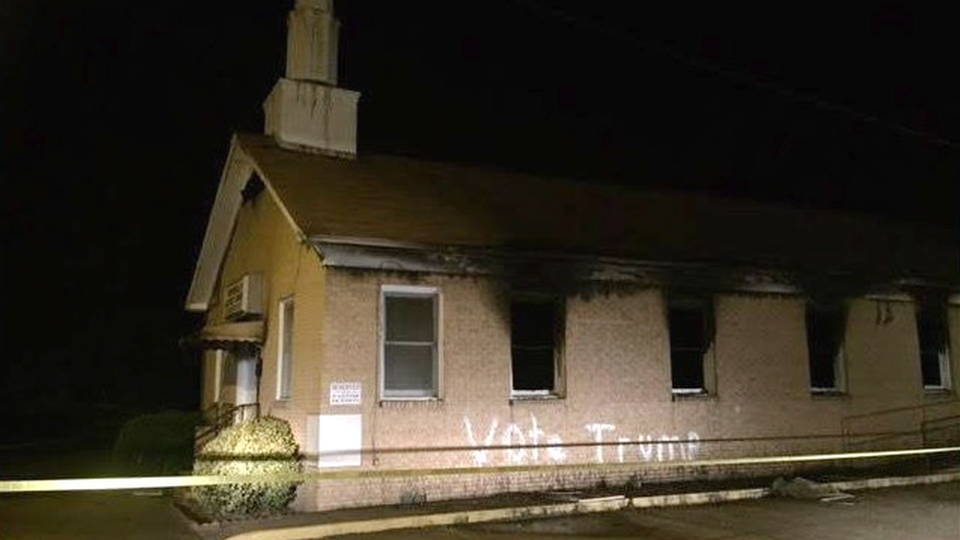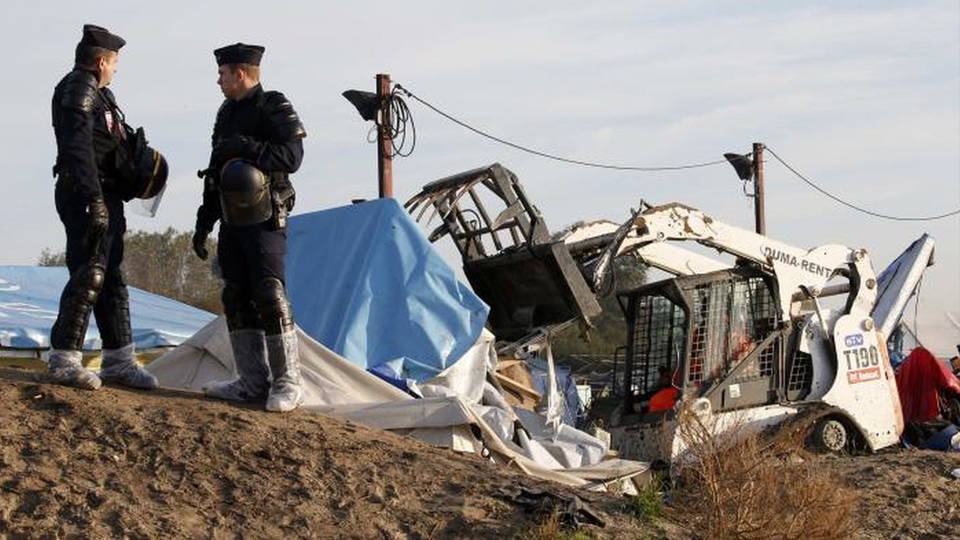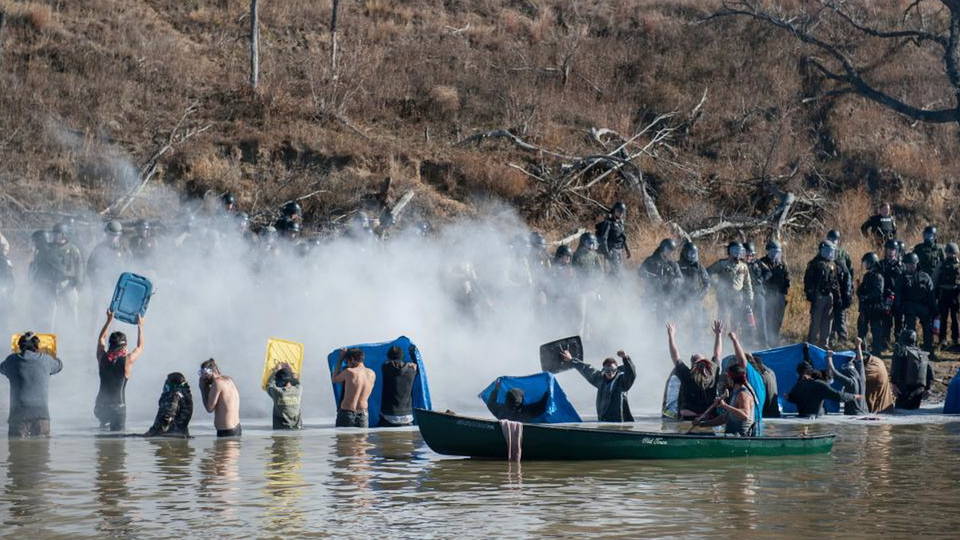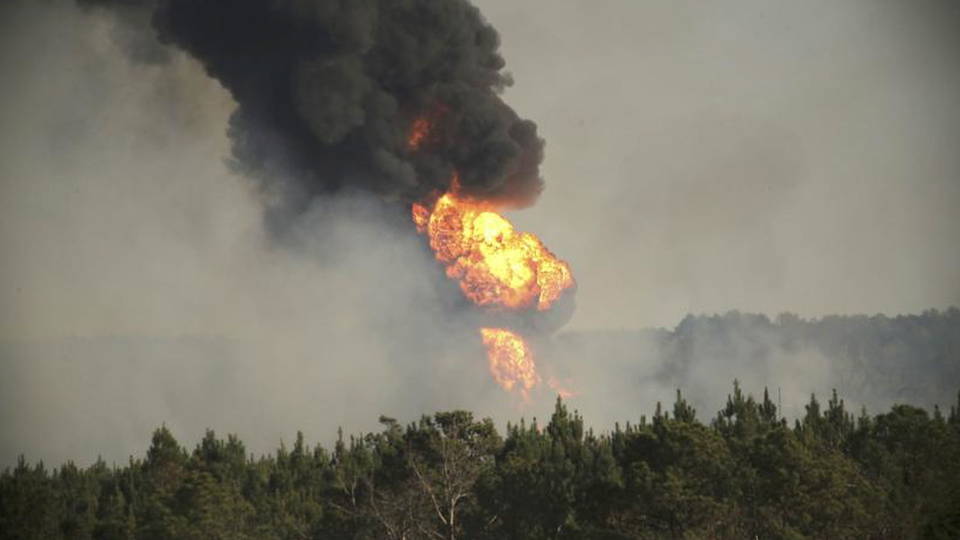democracynow.org
Stories:
 The Indigo Girls Launch #NoDAPL Boycott to Protest Pipeline Owner Who Runs Major Folk Music Festival
The Indigo Girls Launch #NoDAPL Boycott to Protest Pipeline Owner Who Runs Major Folk Music Festival
Many musicians, including Emily Saliers and Amy Ray, better known as the folk duo the Indigo Girls, are now banding together to confront Energy Transfer Partners CEO Kelcy Warren and help stop the pipeline. In addition to owning the pipeline, Warren owns a small music label and is the founder and driving force behind the Cherokee Creek Music Festival in Texas. In addition to raising awareness and funds for the land and water protectors at Standing Rock, the Indigo Girls are organizing musicians to challenge Kelcy Warren directly. Emily Saliers and Amy Ray penned a letter to Warren, which was co-signed by noted artists Jackson Browne, Shawn Colvin, Joan Osborne, Keb’ Mo’ and others. It reads, in part, "[W]e realize the bucolic setting of your festival and the image it projects is in direct conflict with the proposed Dakota Access Pipeline ... This pipeline violates the Standing Rock Sioux Nation’s treaty rights, endangers the vital Missouri River, and continues the trajectory of genocide against Native Peoples." The letter concludes, "In order to stay true to our music and respect the Native Nations that are united against the Dakota Access Pipeline, we will no longer play your festival or participate in Music Road Records recordings." We speak to Emily Saliers and Amy Ray of the Indigo Girls.
TRANSCRIPT
This is a rush transcript. Copy may not be in its final form.
NERMEEN SHAIKH: Many musicians, including Emily Saliers and Amy Ray, better known as the folk duo the Indigo Girls, are now banding together to confront Kelcy Warren and help stop the pipeline. In addition to owning the pipeline, Warren owns a small music label and is the founder and driving force behind the Cherokee Creek Music Festival in Texas.
AMY GOODMAN: The Indigo Girls began speaking out after September 3rd, when Democracy Now! filmed security guards working for the Dakota Access pipeline company attacking Native Americans. The report showed guards unleashing dogs and using pepper spray, and featured people with bite injuries and a dog with blood dripping from its nose and mouth.
WATER PROTECTOR: These people are just threatening all of us with these dogs. And she, that woman over there, she was charging, and it bit somebody right in the face.
AMY GOODMAN: The dog has blood in its nose and its mouth.
WATER PROTECTOR: And she’s still standing here threatening us.
AMY GOODMAN: Why are you letting their—her dog go after the protesters? It’s covered in blood!
AMY GOODMAN: In addition to raising awareness and funds for the land and water protectors at Standing Rock, the Indigo Girls are organizing musicians to challenge Kelcy Warren directly, the CEO of Energy Transfer Partners. Emily Saliers and Amy Ray penned a letter to Kelcy Warren, which was co-signed by Jackson Browne, Shawn Colvin, Joan Osborne, Keb’ Mo’ and others. It read, in part, "[W]e realize the bucolic setting of your festival and the image it projects is in direct conflict with the ... Dakota Access Pipeline ... This pipeline violates the Standing Rock Sioux Nation’s treaty rights, endangers the vital Missouri River, and continues the trajectory of genocide against Native Peoples." The letter concluded, "In order to stay true to our music and respect the Native Nations that are united against the Dakota Access Pipeline, we will no longer play your festival or participate in Music Road Records recordings." That’s what they wrote.
Well, the Indigo Girls, Emily Saliers and Amy Ray, join us here in our New York studio.
Welcome, both, to Democracy Now!
EMILY SALIERS: Good to be here.
AMY RAY: Thanks for having us.
AMY GOODMAN: Emily, talk about what happened, when you played at Cherokee Creek Music Festival in Texas, what it was like, and when you realized the force behind Cherokee Creek was the same one behind the Dakota Access pipeline.
EMILY SALIERS: Well, when we first played Cherokee Creek Music Festival, it was like any other sort of laid-back, bucolic setting, and we had no idea of the—who owned the festival or what his associations were. I mean, if his—and then we participated in the record tribute for Jackson, did a song on that record. I mean, if the record label had been named Oil Pipeline Records, we might have had a clue earlier. But so we played this festival, and then, we’ve been fighting the pipelines in conjunction with a group that we helped start with Winona LaDuke, Native American activist. This group is called Honor the Earth. And we’ve been fighting these pipelines that are proposed to traverse through Native lands and threaten the ecosystems. And we’re particularly stringent about the battle for the Dakota Access pipeline.
And so, we actually got a note on our Facebook page from someone out there who said, "Do you know who this guy Kelcy Warren is, who owns the Cherokee Creek Music Fest that you played?" And we had not known his association. Like Jackson says, none of us really knew the association. So, once we found out, we immediately started talking about what can we do to rectify the situation and our presence in something that is completely the antithesis of what we stand for as artists and as allies for Native communities.
NERMEEN SHAIKH: So what did you do?
EMILY SALIERS: Well, we decided to write a letter to Mr. Warren, and we decided to ask—put a word out to all the artists who had either participated in the record tribute to Jackson or in the Cherokee Creek Music Festival. And so, we sent out this letter. And as quickly as we could, we gathered signatures from artists who stood in solidarity with us, and to ask Mr. Warren to reconsider the pipeline, to not build this pipeline, and to think about Native rights and to think about how music and artists and what we all stand for is completely in contrast to what this pipeline is going to do, which desecrates the environment and runs across Native treaty rights. And these people are protectors of water and land, and there’s nothing in it for them except for what they want to do for all of us and for the good of nature and to respect their sacred burial sites. And so, artists like me and Amy and Jackson and all the artists who signed on to the letter were writing songs about—we oppose the treatment of human beings and land and water in the manner in which Mr. Warren’s company acts. And so, that’s what the letter was. That’s how we got signatures. And then we posted it.
AMY GOODMAN: Amy Ray, have you spoken to Kelcy Warren? Are you able to reach him?
AMY RAY: No, no. I mean, we would love to speak to Kelcy, honestly. I mean, I—he’s passionate about music. I mean, he is a music fanatic. And I feel like—we just really felt like this is a guy who really loves music, and if we could just get through to him on that level and show him the disconnect between all the music that he loves and what his company is doing, that maybe—I mean, maybe we’re being idealistic, but maybe it would get through to him in some way. But we have not spoken with him. We did give the letter directly to him, rather than just through email. We had it—we have a connection to his assistant, who put it on his desk. So—but we have not heard from him. But we did give the letter directly to him.
And there were many more signers on the letter that went to him, who didn’t necessarily want to be public about their signatures. So there’s probably about probably five or six more people that signed on to that letter, as well.
And then, what we’ve done is we posted it on a website called The Bluegrass Situation, who is also reaching out and having people email and call Kelcy and the label, and just starting more of a movement with other musicians to just get in touch and just pressure, pressure from the music community, because—and I think this goes—I think this is a very important lesson for us, as well, is when you play these big festivals and when you play events or you play benefits, to know who’s—where the money’s coming from. And we’ve always prided ourselves on kind of knowing that, and we really just missed this one completely. But it was a good lesson, because it’s like you’re in the middle of Texas, you’re playing a well-funded show.
NERMEEN SHAIKH: Well, can you tell us a little bit more about the Cherokee Creek Music Festival? How many are there?
AMY RAY: Oh, it’s amazing. It’s like there’ll be—it’s a weekend of camping. It’s a family setting. It’s on a creek. All the money goes to children’s charities, as you said before. And there’s all these great artists there, and the environment is just amazing. I mean, you would never even associate it with anything negative, ever. Like it’s like people jamming and hippies and families. And it’s all been—all the money goes to children’s groups. And so, the last thing you would think was this is a guy that’s funding all these Republican candidates and kind of working against everything we work for.
AMY GOODMAN: Well, talk about Honor the Earth specifically, because you both co-founded it with Winona LaDuke, and what this organization is.
AMY RAY: We started it in early ’90s. We went to an Earth Day show in Boston, and Winona spoke. And we freaked out over her speak—speaking. And we were like, "Oh, man. This is how we want to do our environmental work." At the time, we were working sort of in more of a white mainstream kind of world.
AMY GOODMAN: Winona LaDuke, indigenous leader from northern Minnesota, the White Earth Reservation.
AMY RAY: Yeah. We heard her speak, and we were just like, that’s a whole new lens to see everything from. We sat down with her that day, and we started scheming. And we started Honor the Earth along with the Indigenous Women’s Network, Indigenous Environmental Network and the Seventh Generation Fund. And we just had a board that was completely Native. And the idea is, we’re going to be an umbrella organization that funds people that are already doing great work, because so many people are doing great environmental work in the Native communities and cultural sustainability work. And we just gather money. We do benefits. We try to build a bridge between Native and non-Native communities. And we do some lobbying work. And Winona does project work, like working specifically to stop pipelines out of the tar sands or the Dakota Access pipeline. Or we fund—on the other side, we fund really great positive projects, like wind power and solar power and, you know, infrastructure building in communities, that brings up their economic base. So, it’s been around since like—’93?
EMILY SALIERS: Yeah.
AMY RAY: Yeah, and it’s still going. And we just, you know, do a lot of funding and a lot of granting and, every now and again, benefits, and try to bring attention to what’s going on in Indian country.
AMY GOODMAN: As we wrap up, Amy, would you like to read a part of your letter to Kelcy Warren?
EMILY SALIERS: Actually, Amy did pen this letter to Kelcy—
AMY RAY: You helped.
EMILY SALIERS: —but I’m going to read it. As a team member—
AMY RAY: You helped.
EMILY SALIERS: —I’m going to read it.
“Dear Mr. Warren,
"We have played your Cherokee Music Festival and found it to be a compelling gathering of artists and a noble pursuit to help children’s charity organizations across the country. Many of us who have played your festival have invested time and energy into the fight for human rights and environmental justice. For some of us, this mission is the moving force and spiritual foundation of our larger community of musicians, and one of the inspirations to play such rich gatherings as the Cherokee Music Festival. But sadly, we realize that the bucolic setting of your festival and the image it projects is in direct conflict with the proposed Dakota Access Pipeline—a project your company, Energy Transfer Partners, is responsible for spearheading. This pipeline violates the Standing Rock Sioux Nation’s treaty rights, endangers the vital Missouri River, and continues the trajectory of genocide against Native Peoples."
AMY GOODMAN: Well, I want to thank you both for being with us. We’re going to end with some of your own music. We’ve been speaking with Indigo Girls, Emily Saliers and Amy Ray, the Grammy Award-winning Indigo Girls duo, also environmental and indigenous activists. This is Democracy Now!, as we head south to Alabama to a pipeline explosion. But first, some Indigo Girls.
[break]
AMY GOODMAN: The Indigo Girls, that’s right, performing at an Honor the Earth concert at Standing Rock, the Sioux reservation in North Dakota. This is Democracy Now!, democracynow.org, The War and Peace Report. I’m Amy Goodman, with Nermeen Shaikh.
The original content of this program is licensed under a Creative Commons Attribution-Noncommercial-No Derivative Works 3.0 United States License. Please attribute legal copies of this work to democracynow.org. Some of the work(s) that this program incorporates, however, may be separately licensed. For further information or additional permissions, contact us.
 Standing Rock Chair: Obama Could Stop the Dakota Pipeline Today & Preserve Indigenous Sacred Sites
Standing Rock Chair: Obama Could Stop the Dakota Pipeline Today & Preserve Indigenous Sacred Sites
President Obama says the U.S. Army Corps of Engineers is considering rerouting the $3.8 billion Dakota Access pipeline, amid months of resistance from the Standing Rock Sioux Tribe and members of more than 200 other Native American nations and tribes from across the Americas. "My view is that there is a way for us to accommodate sacred lands of Native Americans," Obama said. "And I think that right now the Army Corps is examining whether there are ways to reroute this pipeline in a way." Meanwhile, on Wednesday, police deployed pepper spray and tear gas against dozens of Native American water protectors during a standoff at Cantapeta Creek, north of the main resistance camp. At least two people were shot with nonlethal projectiles. Video and photos show police firing the pepper spray and tear gas at the water protectors, who were peacefully standing in the creek. The U.S. Army Corps of Engineers had ordered police to arrest the Native Americans and destroy a bridge that members of the camp had constructed over the creek in order to protect a sacred burial ground they say is being destroyed by construction and law enforcement activity.
TRANSCRIPT
This is a rush transcript. Copy may not be in its final form.
NERMEEN SHAIKH: President Obama says the U.S. Army Corps of Engineers is considering rerouting the $3.8 billion Dakota Access pipeline, amid months of resistance from the Standing Rock Sioux Tribe and members of more than 200 other Native American nations and tribes from across the Americas. Obama made the comment during an interview with NowThis News.
VERSHA SHARMA: One thing the candidates aren’t really talking about is the Dakota Access pipeline.
PRESIDENT BARACK OBAMA: Yeah.
VERSHA SHARMA: Is that something that you would consider intervening in? People have called for your administration to make a call.
PRESIDENT BARACK OBAMA: We’re monitoring this closely. And, you know, I think, as a general rule, my view is that there is a way for us to accommodate sacred lands of Native Americans. And I think that right now the Army Corps is examining whether there are ways to reroute this pipeline in a way.
VERSHA SHARMA: So that’s a possibility, right?
PRESIDENT BARACK OBAMA: So—so, we’re going to let it play out for several more weeks and determine whether or not this can be resolved in a way that I think is properly attentive to the traditions of the first Americans.
VERSHA SHARMA: Is there something to be done about the way protesters are being treated right now, though? They’re getting sprayed with rubber bullets. We’re seeing some kind of shocking footage.
PRESIDENT BARACK OBAMA: Yeah, I mean, it’s a challenging situation. I think that my general rule when I talk to governors and state and local officials, whenever they’re dealing with protests, including, for example, during the Black Lives Matters protests, is there is an obligation for protesters to be peaceful, and there’s an obligation for authorities to show restraint. And, you know, I want to make sure that as everybody is exercising their constitutional rights to be heard, that both sides are refraining from situations that might result in people being hurt.
NERMEEN SHAIKH: President Obama’s comments came on Tuesday, the same day that North Dakota officials approved an additional $4 million for policing, bringing the total costs of the police crackdown on the pipeline protests to $10 million.
On Wednesday, police deployed pepper spray and tear gas against dozens of Native American water protectors during a standoff at Cantapeta Creek, north of the main resistance camp. At least two people were shot with nonlethal projectiles. Video and photos show police firing the pepper spray and tear gas at the water protectors, who were peacefully standing in the creek. The U.S. Army Corps of Engineers had ordered police to arrest the Native Americans and destroy a bridge that members of the camp had constructed over the creek in order to protect a sacred burial ground they say is being destroyed by construction and law enforcement activity.
AMY GOODMAN: The U.S. Army Corps of Engineers had ordered police to arrest Native American protesters and destroy a bridge that members of the camp had constructed over the creek. The protesters, or water protectors, as they call themselves, had gathered to pray and protect sacred sites they believe were being disturbed by construction and law enforcement activity.
Well, for more, we’re going to North Dakota to speak with Dave Archambault, the chairman of the Standing Rock Sioux Tribe.
Chairman, welcome to Democracy Now! First, please respond to this statement, that I think surprised many, President Obama talking about considering rerouting the pipeline. Can you explain what is being considered right now?
DAVE ARCHAMBAULT II: You know, Amy, what the president is doing is he’s starting a process that is needed, and that is to respect indigenous peoples’ rights. A reroute is something that can require new state permits, new federal permits to cross waterways, new land owner agreements, and it also can restart the process, where proper consultation can take place and environmental studies can happen. And so, that’s a—that’s a huge step. I think this whole process was flawed from the beginning.
But it also has to reflect what we’ve been saying all along, is that indigenous peoples’ rights continue to get violated, and it’s about time that it stop. You know, we’ve been all about protecting water and our treaty territory. If you look at a map—in 2010, there was a study on the number of pipeline breaks. There’s a hole in that map, and that’s our treaty lands. That’s pretty much all we have, and we need to protect it. But that’s one step.
The next step is, is starting to take a look at what is it that we have to do around the world as people. We have to start changing our dependency on fossil fuels, and we have to start investing in renewable energies. Until we stop driving cars that use fossil fuels, this is going to be a force that continues to exist. So we have to start to look at ways we can be self-sustaining without fossil fuels, and force investments, force corporations to look at how can we save this world. Right now, Standing Rock has our sovereign rights, our sovereign lands, and we’re asking that you stop infringing on them. We have said it repeatedly. And I think, with the president’s statement, it’s starting to be heard.
AMY GOODMAN: Can you explain exactly what the process is, the consultation that’s going on for the rerouting? And when will they stop building where they are, or will it involve stopping doing what they’re doing, for example, yesterday and the last week and earlier this week?
DAVE ARCHAMBAULT II: So, this—I don’t have a timeline, and I haven’t been consulted on this. This is just something that comes from what the president has stated in his comments. The company continues to ignore federal government. Company—this company is something that is—they just destroyed some more sacred sites. And they knew about these sites on October 17th, but they didn’t inform anyone until October 27th. They plowed through it. And, you know, that’s cause for the state to ask the company to cease work. That’s cause for the Corps of Engineers to say, "Shut down now. You’re not going to get this permit because you continue to violate indigenous peoples’ rights." But the company is not going to do that, because they feel they have every legal right. And this is driven by money and greed. And it only comes from the continued dependency that we all have on fossil fuels.
NERMEEN SHAIKH: And do you think that the Obama administration can do something more now, as the Army Corps considers rerouting the pipeline?
DAVE ARCHAMBAULT II: Right now they need to say, "No easement. You’re not going to get the easement." The Obama administration or the Army Corps of Engineers can release that statement today, and then the construction will stop. You know, this company is driven with greed and money, but it’s also driven by investors. People who invest in pipeline companies are asking for timelines to be met. But if they know that they will not get the easement, they can stop construction.
AMY GOODMAN: I was interested that President Obama said, "We’re going to look at this for a few more weeks." And I was wondering what it was they are waiting on, as people are shot with pepper spray, rubber bullets, the concern of what will happen, finding an infiltrator who had an AR-15 gun, who put a bandana over his face, who actually had Dakota Access pipeline security ID. What would it take for President Obama—why is he waiting a few weeks?
DAVE ARCHAMBAULT II: You know, Amy, that’s a really good question, and I’m not the person to answer that for you. I think it would be a question that only the Obama administration can answer. We were told that they were going to review the whole process. And so, whatever that means, we’re hopeful and we’re prayerful that the process stops this pipeline and looks at protecting our indigenous rights and our lands and our water.
AMY GOODMAN: Meanwhile, the money that the North Dakota sheriff is getting now, I think it’s what? Up to $10 million, just requested another $4 million. When we were there, we saw the MRAP, the armored personnel carrier. You’ve got the sound cannons, the heavily militarized police. What is your response to what’s happening? And what are they requesting? And what about the involvement of the North Dakota Legislature and the governor?
DAVE ARCHAMBAULT II: OK, Amy, you know, what’s happening is unfortunate with the state government. There were—there has been an oil boom in North Dakota, and—since 2003. And there’s been the exploitation of fossil fuels with fracking. And in the region, northwest region of North Dakota, there’s been an influx of people. Our unemployment rate was 5.0 in United States, and North Dakota was 2.8. There was people coming from all over. And what was happening was there was routine major crimes being committed—murders, rapes, unsolved murders, sex trafficking, the worst drugs that you can think of being trafficked through there. And we didn’t see militarization of law enforcement. We didn’t see National Guard being deployed. We didn’t see the state call a state of emergency. And this has been going on for almost a decade. But as soon as indigenous people and all the supporters come together to stand up against fossil fuels, the state says, "Let’s throw $10 million at this and make them go away."
Well, our commitment is not going to go away. The state has to understand that. And a lot of this force is unnecessary. But that’s just how it is. And, you know, there’s the underlying treatment of indigenous peoples. And we’re saying enough is enough. And it’s starting to expose a lot of things to where—how do we get past this once this is over? How are we going to re-establish relationships? And how are we going to move on? And how are we going to handle ourselves? Because this is starting to create a whole lot of anger and frustration, which was already there, from 200 years, by the treatment of the federal government, state governments on indigenous peoples.
AMY GOODMAN: Finally, I wanted to ask you, Chairman Archambault—in a moment, we’re going to talk more about Kelcy Warren, who is the CEO of Energy Transfer Partners, that owns the Dakota Access pipeline. He also is a folk music maven, has a record label, is big in the Austin music scene. And his music idol is Jackson Browne. We understand Jackson Browne is coming to the Standing Rock Sioux Reservation Thanksgiving weekend on Sunday night and will be having a concert. It’s interesting that Kelcy Warren—the pipeline is called the Dakota Access pipeline, and that his music festival in Texas, where, for example, our next guests, the Indigo Girls, have performed, is called the Cherokee Creek Music Festival. And I was wondering about your thoughts on using Native names—Cherokee Creek and Dakota—the CEO of the company that is pushing this pipeline forward?
DAVE ARCHAMBAULT II: You know, Amy, we brought this concern up. It’s not only the company Dakota Access or Cherokee Creek, but indigenous people have a right to their intellectual property. And our rights have been violated and taken from us all across the board, including our name. So if you look at the state of North Dakota and the state of South Dakota, those states, as well, took our name, and not really understanding what it means. And then, the Dakota Access pipeline, to use our name, Dakota, which means "friend," it’s not right. And that’s an intellectual property that should be owned by us. But it doesn’t matter. It seems like no matter what is our ownership, whatever we own or whatever is our right, it’s been infringed on for the past 500 years.
 "I Do Not Play for Oil Interests": Jackson Browne to His Biggest Fan, the Billionaire Behind #DAPL
"I Do Not Play for Oil Interests": Jackson Browne to His Biggest Fan, the Billionaire Behind #DAPL
When Kelcy Warren of Energy Transfer Partners is not building pipelines, he runs a small record label that puts out folk music. In December 2013, Warren’s record label, Music Road Records, released the album "Looking into You: A Tribute to Jackson Browne." It was a passion project spearheaded by Warren himself, a longtime fan of Browne’s. In a press release for the album, Warren is quoted as saying, "I don’t know of anybody that admires Jackson more than me." Jackson Browne is now one of 13 artists who signed on to a letter to Warren vowing to no longer play in Warren’s Cherokee Creek Music Festival or participate in Music Road Records recordings. In a statement released to Indian Country Today Media Network, Browne also pledged to donate the money he’s received and will receive from the album to tribes opposing the pipeline. Browne writes: "I did not know anything about Kelcy Warren’s other business as the production of this album went forward. Although as a music publisher there is no legal way to deny permission to a record company to cover a song that has been previously published, I could have dissuaded the artists from appearing on this record had I known." Browne goes on to say, "I do not play for oil interests. I do not play for companies who defile nature, or companies who attack demonstrators with trained attack dogs and pepper spray. I certainly would not have allowed my songs to be recorded by a record company whose owner’s other business does what Energy Transfer Partners is allegedly doing—threatening the water supply and the sacred sites of indigenous people."
TRANSCRIPT
This is a rush transcript. Copy may not be in its final form.
AMY GOODMAN: Well, in December of 2013, Kelcy Warren’s record label, Music Road Records, released the album Looking into You: A Tribute to Jackson Browne. It was a passion project spearheaded by Kelcy Warren himself, a longtime fan of Browne’s. In a press release for the album, Warren is quoted as saying, "I don’t know of anybody that admires Jackson more than me. We really had fun with this, and I’m very proud of the final product—it brings joy to an industry that tends to sap it out of me!" he said.
Jackson Browne is now one of 13 musical artists who signed on to a letter to Kelcy Warren vowing to no longer play in Warren’s Cherokee [Creek] Music Festival or participate in Music Road Records recordings. In a statement released to Indian Country Today Media Network, Jackson Browne also pledged to donate the money he’s received and will receive from the album to tribes opposing the pipeline. Jackson Browne writes, quote, "I did not know anything about Kelcy Warren’s other business as the production of this album went forward. Although as a music publisher there is no legal way to deny permission to a record company to cover a song that has been previously published, I could have dissuaded the artists from appearing on this record had I known." Browne goes on to say, "I do not play for oil interests. I do not play for companies who defile nature, or companies who attack demonstrators with trained attack dogs and pepper spray. I certainly would not have allowed my songs to be recorded by a record company whose owner’s other business does what Energy Transfer Partners is allegedly doing—threatening the water supply and the sacred sites of indigenous people," he wrote. Those are the words of Jackson Browne.
Other musicians speaking out against the pipeline include Emily Saliers and Amy Ray, better known as the folk duo the Indigo Girls, who are now banding together to confront Kelcy Warren and help stop the pipeline. We’re going to go to break, and when we come back, the Indigo Girls are with us in studio. But we’re going to play, at our break, Jackson Browne. Jackson Browne is just announcing that he is going to be playing on the Standing Rock Reservation, just as the Indigo Girls did. He’ll be playing at the Prairie Knights Casino on the reservation on—I think it’s November 27th, Sunday night of Thanksgiving weekend. The concert organizers say the event will bring awareness to the fight against the pipeline and help the spirits up of the resistance camps. The event is open to the public and kicks off concerts that the Native Children’s Survival plan to do at the camps to support Standing Rock. Among those who will be performing are Bonnie Raitt. Let’s go to Jackson Browne and then the Indigo Girls.
[break]
AMY GOODMAN: "Which Side" by Jackson Browne. In fact, in one of his statements, Jackson Browne said, "I intend to support public resistance to the Dakota Access pipeline as much as I can. To quote a song of mine: 'Which side? The corporations attacking the natural world, drilling and fracking, who do it with the backing of the craven and corrupt? Or the ones who fight for the earth with all their might, and in the name of all that's right, confront and disrupt?’" That’s Jackson Browne.
 Who is Kelcy Warren, the Texas Billionaire and Folk Music Fanatic Behind the Dakota Access Pipeline?
Who is Kelcy Warren, the Texas Billionaire and Folk Music Fanatic Behind the Dakota Access Pipeline?
We turn now to look at the Texas billionaire behind the Dakota Access Pipeline: Kelcy Warren, the CEO of Energy Transfer Partners. Described by Bloomberg as "among America’s new shale tycoons," Warren is personally worth $4 billion. He has become a major donor to the Republican Party. During this election cycle, he gave over $500,000 to a super PAC backing former Texas Governor Rick Perry. He also maxed out his donations to House Speaker Paul Ryan, House Energy Chair Fred Upton, House Majority Leader Kevin McCarthy and Senate Energy and Natural Resources Chair Lisa Murkowski. Kelcy Warren also owns a small music label and recording company, and is the founder and driving force behind the Cherokee Creek Music Festival in Texas. We speak to Sue Sturgis. Her recent piece on Facing South is headlined "Meet the Texas Billionaire and GOP Donor Behind the North Dakota Pipeline Controversy."
TRANSCRIPT
This is a rush transcript. Copy may not be in its final form.
NERMEEN SHAIKH: We turn now to look at the Texas billionaire behind the Dakota Access pipeline: Kelcy Warren, the CEO of Energy Transfer Partners. Described by Bloomberg as "among America’s new shale tycoons," Warren is personally worth $4 billion. He has become a major donor to the Republican Party. During this election cycle, he gave over $500,000 to a super PAC backing former Texas Governor Rick Perry. He also maxed out his donations to House Speaker Paul Ryan, House Energy Chair Fred Upton, House Majority Leader Kevin McCarthy and Senate Energy and Natural Resources Chair Lisa Murkowski.
Kelcy Warren owns a small music label and recording company, and is the founder and driving force behind the Cherokee Creek Music Festival in Texas. Later in the show, we will be joined by the Grammy Award-winning Indigo Girls, who have written an open letter to Kelcy Warren.
But first I want to turn to Sue Sturgis, editorial director of Facing South. Her recent piece is headlined "Meet the Texas Billionaire and GOP Donor Behind the North Dakota Pipeline Controversy."
AMY GOODMAN: We also invited Kelcy Warren to join us on the show but did not receive a response back.
So, Sue Sturgis, you wrote this very interesting piece in Facing South. Can you talk about who Kelcy Warren is?
SUE STURGIS: Kelcy Warren is a native of East Texas, and he studied civil engineering at the University of Texas at Arlington and went to work in the gas industry. His father, interestingly enough, had been a field hand for the Sun pipeline, which Kelcy Warren’s company now owns. He worked his way up through the industry. And in 1995, he co-founded Energy Transfer with Ray Davis, who you might know as the owner of the Texas Rangers baseball team. And then it was in 2007 that Warren became the co-CEO and chairman of the company.
NERMEEN SHAIKH: Well, can you tell us a little bit about this company that he co-founded in 1995, Energy Transfer Partners?
SUE STURGIS: Yes. Well, as you mentioned in the introduction, you know, he’s been called one of America’s new shale tycoons, but it’s important to note that his company isn’t actually drilling for the oil, but rather moving the oil around. So that’s what they do. And they currently own 71,000 miles of pipelines in the United States.
NERMEEN SHAIKH: Can you explain what that means, moving oil around?
SUE STURGIS: Well, once we get the oil out of the ground, it’s become really important to get it to where it needs to go. And the pipeline is the way that Kelcy Warren has made his fortune, doing that.
AMY GOODMAN: And can you talk about the contributions he has made?
SUE STURGIS: Yes. That was the angle that I was particularly interested in looking at. I thought it was interesting that Chairman Archambault talked about the importance of considering investors in the pipeline. And I thought it was important also to look at the investment that Kelcy Warren and his company has been making in politics over the years.
He’s donated millions of dollars to politics at both the federal and state levels, and much of that money has gone to Republican politicians. During this election cycle, as was mentioned, he’s donated at least $500,000 to Rick Perry’s presidential campaign. And since the primary, he has donated at least $100,000 to organizations that support Donald Trump. Then, also, at the state level, he has been a big supporter of Governor Greg Abbott of Texas, and last year Abbott appointed Warren to the Texas Parks and Wildlife Commission.
And at the same time that Kelcy Warren is making campaign contributions, Energy Transfer Partners has its own PAC that’s also making contributions. So you have this sort of synergistic thing happening between, you know, the contributions, the investments from Warren and from the company, and politics. And during this election cycle, Energy Transfer Partners has invested about $300,000. That’s what we know of so far. Of course, these are moving figures; we’ll probably find out more after the election, when all the reports are in. But about $300,000 to federal candidates, and that’s primarily House and Senate candidates. And then the company is also making investments in state politics, about $100,000 this election cycle so far.
And one of the things that I thought was interesting in my research is that, in recent years, really starting last year, he’s begun—well, the company has begun investing in politics in the Dakotas. So we’ve seen at least $10,000 going to political organizations in both North Dakota and South Dakota, and that’s gone primarily to House—state House and state Senate Republican organizations.
AMY GOODMAN: So, now talk about his role in the folk music scene in Texas and around the country. Talk about the Cherokee Creek Music Festival, his record label, recording company.
SUE STURGIS: Well, in 2007, which was the year that Warren rose to co-CEO and co-chairman of the company, that was really a watershed year for him and a lot of his activities. That was also the year that he founded Music Road Records, which is his independent record label based in Austin. And he also founded a charity that year called Cherokee Crossroads. And it’s the music festival that he then founded that actually funds the charity. So, that’s how that works. The Cherokee Creek Music Festival raises the funds that then goes to Cherokee Crossroads. And that primarily funds children’s causes and also local service organizations.
AMY GOODMAN: So it’s called Cherokee Creek, and you heard me asking Chairman Archambault how interesting the Cherokee Creek Music Festival, the Dakota Access pipeline—you know, all Native American words. And yet we see what’s happening to Native Americans who are facing off against the building of the Dakota Access pipeline, being met with pepper spray, attack dogs, rubber bullets.
SUE STURGIS: Yes, that’s true. I believe the name comes from the community that he has a ranch near. It’s actually called Cherokee, Texas. So, there’s some irony there.
AMY GOODMAN: And Jackson—the significance of Jackson Browne, when it comes to Kelcy Warren’s music tastes?
 Colonial Pipeline Crisis: It's About a Lot More Than Rising Gas Prices
Colonial Pipeline Crisis: It's About a Lot More Than Rising Gas Prices
We end today’s show looking at another pipeline. In Alabama, at least one worker has died and five have been hospitalized after a section of the Colonial pipeline exploded in Shelby County on Monday. This is the second shutdown in just as many months. The column of fire burning from the punctured pipeline reportedly reached 150 feet. This comes after the same pipeline leaked nearly 340,000 gallons of gasoline in Central Alabama in September, forcing the line to shut down for 12 days and leading six governors to declare states of emergency as gas prices rose throughout the region. Since 2006, the company has reported 178 spills and other incidents that released a combined 193,000 gallons of hazardous liquids and caused $39 million in property damage. We speak to David Butler, the Cahaba Riverkeeper. He has traveled to the site of the Colonial Pipeline Company disaster and is monitoring its environmental impacts.
TRANSCRIPT
This is a rush transcript. Copy may not be in its final form.
NERMEEN SHAIKH: We end today’s show looking at another pipeline. In Alabama, at least one worker has died and five have been hospitalized after a section of the Colonial pipeline exploded in Shelby County on Monday. This is the second shutdown in just as many months. The column of fire burning from the punctured pipeline reportedly reached 150 feet. Eyewitnesses described the disaster to ABCNews.
EYEWITNESS 1: It’s smoking!
EYEWITNESS 2: It looked like there was like a plane crash. I’ve never seen anything like this.
NERMEEN SHAIKH: This comes after the same pipeline leaked nearly 340,000 gallons of gasoline in Central Alabama in September, forcing the line to shut down for 12 days and leading six governors to declare states of emergency as gas prices rose throughout the region. Since 2006, the company has reported 178 spills and other incidents that released a combined 193,000 gallons of hazardous liquids and caused $39 million in property damage.
AMY GOODMAN: Now Democrats on the House Energy and Commerce Committee are seeking an investigation of the Georgia-based company.
Well, Democracy Now! invited Colonial Pipeline Company to join us on the show; they declined. We’re going to Birmingham, Alabama, where we’re joined by David Butler, the Cahaba Riverkeeper. He has traveled to the site of the Colonial Pipeline Company disaster, is monitoring its environmental impacts.
David, welcome to Democracy Now! We only have a few minutes. Can you describe what’s happening there?
DAVID BUTLER: Yeah, absolutely. First, you know, we want to express our condolences to the worker that passed away and also the workers that are injured. And what happened was, they were doing some routine work on the pipeline in preparation for the repair that they need to do on the previous leak site, and there was a contact with the pipe, and caused an explosion.
NERMEEN SHAIKH: But tell us a little bit about the ecosystem of this river. There are reportedly more species of fish in the Cahaba River than there are in the whole state of California.
DAVID BUTLER: Absolutely. It’s a tremendously unique ecosystem. And the area that the pipeline is in is tremendously sensitive. And, you know, certainly, our work is centered around preserving and protecting what’s left.
AMY GOODMAN: David, if you can just talk about what you know about this explosion and the accident that happened a few months ago? I mean, we’re in the midst of a presidential election year; not one reporter in the debates asked about the issue of climate change, of the presidential candidates. But what is happening right now? What is this Colonial pipeline? How long is it? Six governors—in the last explosion, six governors declared a state of emergency?
DAVID BUTLER: Yeah. And, you know, it’s been one of the disappointing aspects of the story, to us, is that, you know, really, the national media focus has been on the supply issue and not so much the environmental impact of incidents like this and sort of the long-term outlook for having pipelines crisscrossing all over the country.
AMY GOODMAN: And who is running the Colonial Pipeline Company? Who do you hold responsible? What are they saying?
DAVID BUTLER: Well, we’ve been in constant contact. And certainly, there’s kind of two issues. There’s the issue of why did it happen. And we’re still, like everybody else, kind of looking for answers, you know, to explain the previous leak and also this one. And then there’s the issue of how they’ve responded. And, you know, it’s been really surprising to us that they’ve allowed us complete access. They’ve been incredibly transparent with us and continue to allow me access to both the river in the area and any information that we want about, you know, what they’re doing and how they plan to protect the river.
AMY GOODMAN: Well, David Butler, we want to thank you for being with us, Cahaba Riverkeeper, traveled the site—to the site of the Colonial Pipeline Company disaster, monitoring the environmental impacts.
That does it for our show. We’ll be doing a five-hour special on election night from 7:00 Eastern time in the evening until midnight. We hope you tune in at democracynow.org or your station runs us. Tune in there.
Headlines:Obama Criticizes FBI Director Comey over Clinton Email Announcement

In news from the campaign trail, President Obama has criticized FBI Director James Comey for announcing an investigation into a new batch of Hillary Clinton emails. They were discovered as part of a probe into former Congressmember Anthony Weiner, the estranged husband of top Clinton aide Huma Abedin, who is under investigation after he sent illicit sext messages to an underage girl. Comey’s announcement only days before Election Day has jolted the race and narrowed Hillary Clinton’s lead over Donald Trump. This is President Obama.
President Barack Obama: "And I do think that there is a norm that when there are investigations, we don’t operate on innuendo, we don’t operate on incomplete information, we don’t operate on leaks. We operate based on concrete decisions that are made. When this was investigated thoroughly the last time, the conclusion of the FBI, the conclusion of the Justice Department, the conclusion of repeated congressional investigations was that she had made some mistakes, but that there wasn’t anything there that was prosecutable."
Obama is campaigning for Clinton every day this week in North Carolina, Florida and Ohio.
TOPICS:
Obama
FBI
Hillary Clinton
2016 Election
Woman Who Accuses Trump of Raping Her at 13 Cancels News Conference

In more election news, a woman who has sued Donald Trump for allegedly raping her two decades ago, when she was 13 years old, canceled a scheduled news conference Wednesday. The woman’s lawsuit alleges: "Trump tied plaintiff to a bed, exposed himself to plaintiff, and then proceeded to forcibly rape plaintiff. … Trump responded to plaintiff’s pleas by violently striking plaintiff in the face with his open hand and screaming that he would do whatever he wanted." The lawsuit alleges Trump raped her at a party hosted by billionaire Jeffrey Epstein, who has been jailed on charges of soliciting sex from a minor. The woman, who has remained anonymous, was scheduled to come forward on Wednesday but canceled the conference after her lawyer, Lisa Bloom, said she had received multiple death threats. Bloom said, "She has decided she is too afraid to show her face. ... She is in terrible fear." Trump’s lawyer has denied all the allegations, saying they are "not only categorically false, but disgusting."
TOPICS:
Donald Trump
2016 Election
Louisiana: Police Pepper-Spray Protesters Outside David Duke Senate Debate

In local election news, in Louisiana, police attacked protesters with pepper spray, as the group demonstrated against U.S. Senate candidate, former Ku Klux Klan leader David Duke outside a candidate debate Wednesday night held at the historically African-American college Dillard University in New Orleans. At least one protester was detained by police, and others were forced out of the venue. The six-candidate debate was closed to the public and occurred inside an empty auditorium.
TOPICS:
White Power
2016 Election
Race in America
Mississippi: Black Church Burned, Vandalized with Words "Vote Trump"

In Mississippi, authorities are investigating the burning and vandalism of a historic African-American church in Greenville on Tuesday night. The 111-year-old Hopewell Missionary Baptist Church was torched and then spray-painted with the words "Vote Trump." Authorities say they are investigating the attack as a hate crime. Greenville Mayor Errick Simmons called the incident "an attack on the black church and the black community. … This happened in the ‘50s and the ‘60s. This should not happen in 2016."
TOPICS:
Mississippi
Race in America
Amnesty Accuses Iraqi Militias Fighting ISIS of Torture

In Iraq, hundreds of families are fleeing the fighting in eastern Mosul amid the U.S.-backed Iraqi army’s offensive to retake the city from ISIS. Amnesty International is accusing some of the militias fighting against ISIS of revenge attacks against local villagers. The group says some militia members have engaged in torture: tying suspected ISIS sympathizers to cars and driving them through villages, beating people’s faces with cables and holding them in inside poultry cages in public.
TOPICS:
Iraq
Pentagon: 2 U.S. Soldiers Killed in Afghanistan

The Pentagon says two U.S. soldiers have been killed in Kunduz, Afghanistan. U.S. soldiers have been backing the Afghan forces battling the Taliban, which took control of the city of Kunduz in October. Kunduz is also the site of the deadly U.S. bombing of a Doctors Without Borders hospital in October 2015 which killed 42 people, including patients and staff. This comes as the United Nations is a warning of a new wave of displacement in Afghanistan amid the ongoing violence. At least 1 million Afghans have been uprooted from their homes by the violence this year.
TOPICS:
Afghanistan
Pentagon: U.S. Drone Strike in Syria Kills al-Qaeda Leader

The Pentagon says a U.S. drone strike killed an al-Qaeda leader in Syria last month. Navy Captain Jeff Davis says the strike on October 17 killed Haydar Kirkan, who allegedly had ties to Osama bin Laden.
TOPICS:
Drone Attacks
Syria
France: Authorities Force Remaining Refugees from Calais Camp

In France, authorities have forced the remaining 1,600 refugees out of the Calais refugee camp, known as "The Jungle." Authorities have been in the process of demolishing the camp for more than a week and busing the camp’s approximately 7,000 residents to refugee intake centers across France. The final refugees removed Wednesday were predominantly children and teenagers, mostly from Afghanistan and South Sudan. They had been refusing to leave the refugee camp, hoping to win asylum in Britain, where many say they have family members.
TOPICS:
France
Refugees
Britain: Court Rules Lawmakers Have to Vote on Brexit

Meanwhile, in breaking news from Britain, the plan for the country to leave the European Union has been thrown into turmoil after a court ruled today that Parliament members have to vote on whether in fact to begin the formal exit proceedings. In June, Britain stunned the world by voting to leave the European Union during a nationwide referendum, leading to the resignation of Prime Minister David Cameron.
TOPICS:
Britain
Angela Merkel: Turkey's Crackdown on Press Freedom "Extremely Alarming"

German Chancellor Angela Merkel has spoken out against the crackdown on press freedom in Turkey, where 170 news outlets have been forced to close since the failed military coup attempt in July. Earlier this week, police raided the Istanbul office of the prominent Cumhuriyet newspaper, detaining at least 12 journalists and administrators on terrorism charges. The newspaper won the 2016 Right Livelihood Award.
Chancellor Angela Merkel: "As to Turkey, it is extremely alarming to me and the federal government that the freedom of the press is being curtailed time and again. The latest example of these already very unfortunate developments is what is happening to the editors and journalists of the newspaper Cumhuriyet. We have serious doubts that this is allowed under the principles of a constitutional state."
TOPICS:
Turkey
Germany
Freedom of the Press
Iowa: White Man with History of Domestic Abuse Arrested for Shooting Police Officers

In Iowa, a man has been arrested following the fatal shootings of two police officers. Suspect Scott Michael Greene, who is white, is accused of killing the two white police officers in "ambush-style" attacks early Wednesday morning. The shootings come a few weeks after Greene brought a Confederate battle flag to a football game at Urbandale High School and waved it in front of people of color. He was thrown out of the stadium by police. He has also been accused of multiple instances of domestic violence. A few days after he brought the Confederate flag to the football game, he was arrested and charged with elderly abuse after he reportedly attacked his mother. He was also charged for domestic violence in 2001. The charges were later dropped.
TOPICS:
Iowa
Police
Domestic Violence
ND: Police Attack Protectors with Tear Gas in Latest Standoff Against Pipeline

In North Dakota, police deployed pepper spray and tear gas against dozens of Native American water protectors during a standoff at Cantapeta Creek, north of the main Oceti Sakowin camp where thousands have been resisting the construction of the $3.8 billion Dakota Access pipeline. At least two people were shot with nonlethal projectiles. Video and photos show police firing the pepper spray and tear gas at the water protectors, who were peacefully standing in the creek. The U.S. Army Corps of Engineers had ordered police to arrest the Native Americans and destroy a bridge that members of the camp had constructed over the creek in order to protect a sacred burial ground they say is being destroyed by construction and law enforcement activity. This comes after President Obama said the Army Corp of Engineers is considering plans to reroute the Dakota Access pipeline. We’ll have more on the latest standoff and Obama’s comments after headlines with Standing Rock Sioux Tribal Chairperson Dave Archambault II.
TOPICS:
Dakota Access Pipeline
Lawmakers Seek Investigation of Colonial Pipeline After Fatal Explosion

In Alabama, the Colonial pipeline remains shut down following a fatal explosion along a section of the pipeline on Monday in Shelby County, Alabama. One worker died and five were hospitalized after columns of fire burst from the punctured pipeline and shot up to 150 feet in the air. Colonial Pipeline Company has said as many as 168,000 gallons of gasoline could have burned, spilled, evaporated or remained in the pipeline following the blast. Democrats on the House Energy and Commerce Committee are seeking an investigation of the Georgia-based company. This comes after this same pipeline leaked nearly 340,000 gallons of gasoline in Central Alabama in September, forcing the line to shut down for 12 days and leading six governors to declare states of emergency as gas prices rose throughout the region. The Colonial pipeline carries 1.3 million barrels of gasoline per day down to refineries in Texas and Louisiana, accounting for a full 40 percent of the region’s gasoline. We’ll have more on the pipeline explosion later in the broadcast.
TOPICS:
Natural Gas & Oil Drilling
Pipeline
GE & Baker Hughes to Merge, Creating 2nd Largest Oilfield Service Company

In more oil and gas news, General Electric and Baker Hughes have announced plans to merge, which would create the second largest oilfield service company in the world, after Schlumberger. The merger comes amid increasing consolidation in the oil and gas industry.
TOPICS:
Natural Gas & Oil Drilling
Michigan: Nestlé Seeking to Bottle 400 Gallons/Min. of Lake Michigan Water for Free

And in northern Michigan, a Nestlé bottling plant that has been sucking water out of aquifers that feed Lake Michigan for free for years is now petitioning the state regulatory agency for permission to expand and pump even more fresh water out of the ground for free. The Nestlé Ice Mountain bottling plant in Mecosta County, Michigan, is proposing a $36 million expansion of its plant. It’s asking the Michigan Department of Environmental Quality for permission to more than double the amount of water it can pump out of the ground, from 150 gallons per minute to 400 gallons per minute. The bottling plant has been the site of a more than decade-long struggle by local residents, who oppose the extraction of the groundwater for profit. This is local activist Peggy Case.
Peggy Case: "So the water that Nestlé is bottling, here and elsewhere in our state, is coming from the Great Lakes Basin. It is feeding here into Dead Stream and Cold Creek, then into the Little Muskegon River, that aquifer, and then eventually, ultimately, into Lake Michigan. So, it’s Great Lakes Basin water. It’s part of the commons. It belongs to all of us. And part of the reason that people in Mecosta were pretty upset about it is that the extraction of that water was being—it was being taken out of the watershed. The streams were being pumped down, to the point where the Dead Stream looked like a mudhole at one point, and bottled and shipped all over the world."
Click here to see our full interview with Peggy Case and other activists from when Democracy Now! was in Michigan.
TOPICS:
Michigan
Water
-------
Donate today →
Follow:




COLUMN

"Dakota Access Pipeline CEO Kelcy Warren should face the music" by Amy Goodman & Denis Moynihan
President Barack Obama foreshadowed more complications for the Dakota Access pipeline this week, as he told an interviewer that “right now the Army Corps is examining whether there are ways to reroute this pipeline.” With hundreds arrested in recent weeks at the Standoff at Standing Rock, North Dakota, the movement to halt construction of this 1,200-mile, $3.8 billion oil pipeline only builds. Musicians are increasingly joining the fray, striking an unexpected chord: pressuring oil billionaire Kelcy Warren, CEO of Energy Transfer Partners, which owns the pipeline. Warren also owns a small music label and recording company, and is the founder and driving force behind the Cherokee Creek Music Festival in Texas. Many musicians, including folk/rock legend Jackson Browne, are banding together to confront Warren and help stop the pipeline.
In a statement published in September by Indian Country Today Media Network, Jackson Browne wrote: “I met Kelcy Warren on one occasion, when I played at the Cherokee Creek Music Festival, held at his ranch. Later his company, Music Road Records, produced an album of my songs. Though I was honored by the ‘tribute’ and think highly of the versions—which were done by some of my favorite singers and songwriters, I had nothing to do with producing the recordings or deciding who would be on it.”
Jackson continued: “I do not support the Dakota Access pipeline. I will be donating all of the money I have received from this album to date, and any money received in the future, to the tribes who are opposing the pipeline.” The album Browne referenced is titled, “Looking Into You: A Tribute to Jackson Browne.”
Emily Saliers and Amy Ray, better known as the folk duo the Indigo Girls, have been to the Standing Rock resistance camps, where thousands have been facing off against an increasingly violent, militarized police force that is facing down the Native American water protectors with attack dogs, armored personnel carriers, pepper spray, concussion grenades and deafening acoustic cannons. In addition to raising awareness and funds for the land and water protectors at Standing Rock, the Indigo Girls are organizing musicians to challenge Kelcy Warren directly.
“Kelcy Warren also happens to be a passionate music lover and owns a festival, Cherokee Creek music festival,” they wrote in a recent Facebook post. “Indigo Girls have played the festival and had a song on the [Jackson Browne] tribute record. When we participated in those events, we had no idea about Kelcy Warren’s connection to big oil and its imminent threat to the Standing Rock Sioux. Now we know.”
They wrote a letter to Warren, which was co-signed by Jackson Browne, Shawn Colvin, Joan Osborne, Keb’ Mo’ and others. It read, in part, “We realize the bucolic setting of your festival and the image it projects is in direct conflict with the Dakota Access pipeline ... this pipeline violates the Standing Rock Sioux Nations’ treaty rights, endangers the vital Missouri River, and continues the trajectory of genocide against Native Peoples.” The letter concluded, “We will no longer play your festival or participate in Music Road Records recordings. We implore you to stop construction of the Dakota Access pipeline.”
Kelcy Warren is a Texas oil billionaire several times over, and might not be easily deterred by a threatened boycott. In fact, when global oil prices began dropping, “Nobody was happier about the crash than Energy Transfer Chairman and CEO Kelcy Warren,” Bloomberg Markets reported. All his competition, Warren gloated, “vaporized.” He, like many analysts, anticipates that oil prices will rise, fracking in the Bakken shale region will boom again, and his Dakota Access Pipeline will be the only conduit to carry the crude oil to the Texas Gulf Coast for refining and export. “You must grow until you die,” Warren told Bloomberg.
Jackson Browne also wrote in his statement: “I intend to support public resistance to the Dakota Access pipeline as much as I can. To quote a song of mine: ‘Which side?
“—the corporations attacking the natural world, drilling and fracking, who do it with the backing of the craven and corrupt?
“—Or the ones who fight for the earth with all their might, and in the name of all that’s right,
“Confront and disrupt?’”
In the press release about the Jackson Browne tribute album from Music Road Records, Kelcy Warren wrote, “I don’t know of anybody that admires Jackson more than me.” As Browne and other musicians rally with the land and water protectors at Standing Rock, and as President Obama signals post-election action on the pipeline, it’s time for Kelcy Warren to face the music.
-------
NEW BOOK

Apply today to be a Democracy Now! intern
-------
207 West 25th Street, 11th Floor
New York, New York 10001, United States
-------
-------

No comments:
Post a Comment